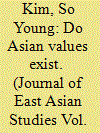| Srl | Item |
| 1 |
ID:
096600


|
|
|
|
|
| Publication |
2010.
|
| Summary/Abstract |
The Asian values debate has been long on speculative advocacy but short on empirical validation, with statistical tests emerging only lately. This study explores two questions: whether Asians indeed hold distinct cultural attitudes when compared with non-Asians and whether these cultural attitudes and beliefs identified as Asian values form coherent dimensions among Asians. The study first identifies four dimensions of Asian values based on a review of various Asian values discourses: familism, communalism, authority orientations, and work ethic. The findings from the empirical analysis based on multilevel models and factor analysis return mixed support for the Asian values hypothesis. Although East Asian respondents do exhibit strong work-related values compared with those from other regions, commitment to familial values and authoritarian orientations are actually lower among East Asians. Also, while preference for strong leadership and parental duty do turn out to form distinct sets of attitudes among South and Southeast Asians, the four dimensions do not constitute a clear value complex in the minds of East Asians.
|
|
|
|
|
|
|
|
|
|
|
|
|
|
|
|
| 2 |
ID:
077296


|
|
|
|
|
| Publication |
2007.
|
| Summary/Abstract |
A central assumption in the globalization literature is that economic openness generates economic insecurity and volatility. Based on this assumption, scholars of international political economy have proposed the compensation hypothesis, which claims that globalization bolsters rather than undermines the welfare state by increasing public demand for social protection against externally generated economic instability. The openness-volatility link is dubious, however, on both theoretical and empirical grounds. In this study, I revisit the volatility assumption, focusing on a crucial difference between openness and external risk in their effect on volatility. My statistical analysis of a panel data set from 175 countries (1950-2002) finds a consistent effect of external risk on volatility of the major economic aggregates, but a largely insignificant effect of openness. These findings suggest that economic volatility may be a mistaken link in explaining the openness-spending nexus, calling for further research on the causal mechanisms linking the two
|
|
|
|
|
|
|
|
|
|
|
|
|
|
|
|